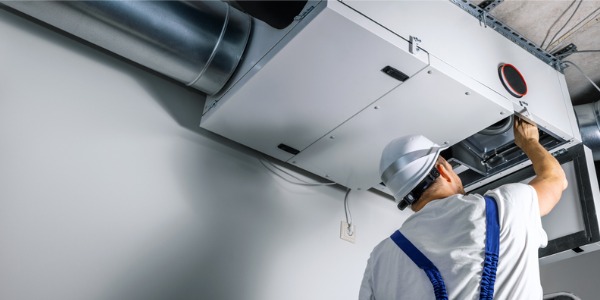What is an HVAC Technician?
An HVAC technician is a professional who installs, maintains, and repairs heating, ventilation, and air conditioning (HVAC) systems. These systems are responsible for keeping indoor spaces comfortable by controlling temperature, air quality, and humidity. HVAC technicians work in homes, businesses, and factories, ensuring these systems run smoothly and efficiently.
HVAC technicians are skilled in troubleshooting problems with heating and cooling systems. They repair or replace components like air conditioners, furnaces, and ventilation systems, ensuring everything operates properly. Technicians must also be familiar with working with refrigerants and must follow safety protocols to avoid accidents during their work.
Get online training through our partner:
What does an HVAC Technician do?

Duties and Responsibilities
The duties and responsibilities of HVAC technicians can vary depending on the specific job, industry, and employer. However, here are some common tasks and responsibilities associated with the role:
- Installing HVAC Systems: Set up heating, ventilation, air conditioning, and refrigeration systems in homes, businesses, and industrial spaces. This includes setting up equipment, making necessary connections, and ensuring everything is properly installed.
- Maintaining HVAC Systems: Perform routine maintenance tasks like cleaning filters, checking refrigerant levels, inspecting ducts, and replacing worn-out components to keep systems running efficiently and prevent breakdowns.
- Repairing HVAC Systems: Diagnose issues with heating and cooling systems and make necessary repairs. This may involve fixing or replacing parts like motors, compressors, and thermostats.
- Troubleshooting: Identify and diagnose problems with HVAC systems, using diagnostic tools and knowledge to find issues and correct them.
- Providing Customer Service: Explain issues and solutions to customers in simple terms, offer advice on system maintenance, and ensure customer satisfaction with the service provided.
- Ensuring Safety: Follow safety protocols when working with electrical components, refrigerants, and gas-powered systems to prevent accidents and ensure proper functioning of HVAC systems.
- Keeping Records: Maintain detailed records of work performed, including repairs, maintenance, and system inspections, for both customers and for warranty purposes.
- Upgrading Systems: Recommend system upgrades or improvements to improve efficiency and energy savings, based on the technician's knowledge of new technologies and products.
Types of HVAC Technicians
There are several types of HVAC technicians, each specializing in different aspects of HVAC systems. The main types include:
- Heating Technician: Focuses primarily on the installation, maintenance, and repair of heating systems such as furnaces, boilers, and heat pumps. They ensure these systems are working efficiently to provide warmth during colder months.
- Air Conditioning Technician: Specializes in installing, maintaining, and repairing air conditioning systems. This role involves ensuring that cooling units are running efficiently and properly handling refrigerants.
- Refrigeration Technician: Works with refrigeration systems, including those used in commercial and industrial settings, such as walk-in coolers, freezers, and refrigerated transport units. They ensure these systems are functioning correctly and efficiently.
- Ventilation Technician: Focuses on ventilation systems, including air ducts, exhaust fans, and ventilation equipment. They ensure proper airflow, preventing issues like poor air quality or ventilation blockages.
- Commercial HVAC Technician: Specializes in large-scale HVAC systems used in commercial buildings, including offices, malls, factories, and hotels. They often work with more complex and powerful systems compared to residential HVAC technicians.
- Residential HVAC Technician: Works with HVAC systems in homes, installing, maintaining, and repairing heating, cooling, and ventilation systems for residential customers.
- Sheet Metal Worker (HVAC): While not always classified as a technician, sheet metal workers install the ductwork, air handlers, and other metal components necessary for HVAC systems to function. They may work closely with HVAC technicians during system installation or repairs.
What is the workplace of an HVAC Technician like?
The workplace of an HVAC technician can vary depending on the job. Technicians often work in a variety of settings, including homes, commercial buildings, industrial sites, and construction sites. In residential settings, they might work in people's homes to install or repair heating and cooling systems. In commercial or industrial environments, HVAC technicians may handle larger, more complex systems in office buildings, factories, schools, or hospitals.
HVAC technicians frequently work indoors, but sometimes they have to work outdoors, especially when installing or repairing rooftop units or outdoor air conditioning units. The job may require them to work in tight spaces, such as attics, basements, crawl spaces, or mechanical rooms, which can be physically demanding. They may also have to handle heavy equipment and materials like large air handlers or ductwork.
The work environment can vary based on the time of year and weather. In the summer, HVAC technicians often deal with air conditioning repairs, while in winter, they focus more on heating systems. The job can involve exposure to temperatures that are either too hot or too cold, depending on the system they are working on. HVAC technicians must also follow safety protocols to protect themselves from electrical hazards, refrigerants, and other potential dangers in the workplace.
Frequently Asked Questions
Construction and Trade-Related Careers and Degrees
Careers
- Building Inspector
- Carpenter
- Concrete Worker
- Construction Engineer
- Construction Manager
- Construction Worker
- Drywall Installer
- Electrician
- Heavy Equipment Operator
- HVAC Technician
- Ironworker
- Mason
- Painter
- Paving Stone Installer
- Pipefitter
- Pipelayer
- Plasterer
- Plumber
- Rigger
- Roofer
- Sheet Metal Worker
- Steamfitter
- Stone Cutter
- Tile and Marble Setter
- Welder
Degrees
- Building Inspection
- Carpentry
- Construction Engineering
- Construction Management
- Electrical Engineering Technology
- Electrical Technology
- Heavy Equipment Operation
- Masonry
- Plumbing
- Refrigeration, Air Conditioning, Heating and Gas Technology
- Welding
HVAC Technicians are also known as:
Heating, Ventilation, and Air Conditioning Technician